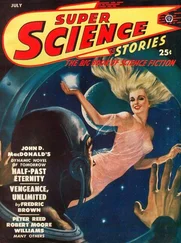Lie in the heat with the sweat running across your ribs and dig your fingers into your palms and curse them. Remember the look of the young one that went by. Remember his “just out” look. Remember when they gave you your name back and every cop on every corner was a guy who ached to smash what was left of your teeth down your throat.
James Forbes walked the night streets, his feet scuffing through the candy wrappers, the chewed cigar butts, the cellophane off the cigarettes, the clotted spittle, and somehow he kept his eyes straight ahead and resisted the impulse to look behind him.
A woman with frizzed blond hair and a body that sagged under her bright cheap dress stepped out of a doorway and said, “Wanna party, chum?”
Barely moving his lips, he said one word.
As he walked slowly on, she screamed obscenities after him. Two boys leaning against a darkened storefront laughed at her. She turned on them as Forbes walked on. Behind him, he heard her laugh.
He walked and he heard George’s heavy voice. George, round and happy and doing a twenty for second degree. George was back there behind the walls and he’d be right there for ten more years. I’ll be forty then, Forbes thought with a sense of shock, and felt as though he should do something for George somehow to make it easier.
Then he could hear George’s soft and heavy voice. “You’re jus’ heah for a little time, boy. Just a little time. But they somehow suck the guts out of you in a little time. Why, when I come in I was goin’ a head back as soon as I got out an’ I was goin’ to separate the head from the neck of my fine fren ‘at turned me in. I surely was, boy. Now I’m one scared boy. When I get out, I’m walkin’ that chalk line. I surely am. I won’t be no trouble to noooobody. No sir! I’m leavin’ my guts in heah. So’ll you, boy. So’ll you.”
Forbes remembered that he had said, “Not for me, George. I was framed into this place and I’m going to get even.”
George had said, “Maybe you was framed, boy. Maybe in kind of a funny kind a way everybody in heah was framed — whether they did what they say they did or not. But you won’t have the guts to get even, boy. I tell you now. You left your guts all over them fields out there in the sun with them screws a-standin’ and a-watchin’ while you spewed ’em out. You’ll see, boy.”
He walked through the night streets and clenched his fists and felt the muscles of his arms and shoulders writhe under the skin. He smiled once, his lips flattening against his teeth. They put him up there behind those walls and he grew the muscles that would smash them. He tightened his fists harder, felt the calluses under his fingertips.
Ahead was the street. The well-remembered street. He crossed diagonally and walked down the far side, walking more slowly, alert for any sign of someone who might be watching... and waiting... They would know that he was out. They would know.
He stopped on the corner, stood absolutely still and looked back the way he had come. A couple passed, their arms around each other’s waists, the girl giggling at something the boy said in a low, hoarse tone. A taxi rocketed by, the springs smacking against the frame as it hit the potholes in the asphalt.
Forbes crossed the street, walked back the way he had come. The house was just the same, a battered brownstone with a massive front door, always unlocked. Mrs. Lesnovack would be asleep in the room just off the entrance hall. The street was empty. He hurried up to the door, pushed it open far enough to slip inside and let it close softly.
The twenty-watt bulb left shadows in the corners of the front hall. He looked up the wide stairway. The house was asleep. He held his breath, heard the sing of blood in his ears, the steady fast thud of his pulse.
Up the stairs. Quietly. Watch the third step — three years ago it creaked. Stay close to the railing. Good. No light on the second floor. Down the corridor smelling of age and dust and the disorderly lives of a thousand transients. The girl who drank the iodine lived in that room. The trumpet player lived in the next one.
It was the room beyond that that mattered.
She lived in that room.
He stood by the door, suddenly afraid that she would be out. His fear was a tangible, chilling thing.
Tap, tap, tap. Softly. Just loud enough to wake her. Not loud enough to wake anyone else. Tap, tap, tap. How will she look with sleep misting her eyes, with her golden hair falling to her shoulders? Tap, tap, tap. She should have heard that. She should be coming to the door. She wouldn’t open it. You don’t open doors at night if you are a girl and if you live in a place like Mrs. Lesnovack’s.
The creak of the floorboard. Sleepy voice. Plaintive. “Who is it?”
Lips close against the stained wood of the door. “Open up. It’s Jim.”
Hands that fumble with the chain, the door swung wide. Arms high around his neck, the scent of hair against his cheek as he stumbled into the room, shutting the door behind him.
Her broken voice said, lips touching his face, “Oh, Jim! Jim! I didn’t know you’d get here so soon.”
She left him abruptly, saying, “I’ve got to look at you.”
“No lights!” he whispered softly. “Someone may be watching your window.”
She was a vague whiteness against the black. She walked to the window and raised the dark shade. On a building a half block away a sign blinked on and off, on and off. Stanley Beer... Stanley Beer... Stanley Beer...
With the shade up there was a second’s space of light in the room, constantly interrupted. In its light, he saw her moving over to the bed. On and off. On and off. It gave her movement an odd quality, as in a very old motion picture — or a penny arcade.
He sat on the bed and held her hand tightly.
“Was it too awful, my darling?” she whispered.
“It’s over now. It would have been — easier if you’d come to see me once in a while.”
“I know. I know, darling. I should have. But I couldn’t bear the thought of seeing you in that horrible place. I’d remember it all my life. It was better that I didn’t come. I wrote you all the time. Don’t you think it was better?”
“I guess so,” he admitted. “You wrote happy letters.”
Hotly she said, “What would you have had me write? Tragic things, stained with my tears?”
“No. No. I only meant that I liked the letters. They helped me wait for now.”
“I couldn’t believe that such a thing had happened to us, Jim. To us! When I sat in that terrible courtroom, heard that horrible man say, ‘Five years,’ I thought I’d die right there. I really did. As it was, I didn’t stop crying for three days.”
“How is Besterson doing?”
“Why — all right, I suppose.” Her hand tightened on his. “What are you going to do about it?”
The light, on and off, on and off, flickered across her pale face, upturned. Lips red. Shoulders smooth. Pale lace at her throat. Clean lines of throat, of brow.
He shrugged. “Do? What is there to do? I was his accountant. He was hard up. He robbed himself, phoned the police, told them I had the combination to the safe. They came to my room and woke me up. They found bills with the right serial numbers in the side pocket of my jacket. Open and shut. Cut and dried. What is there to do?”
He felt her hand relax. “I’m glad you’re not — going after him,” she said softly.
“You wouldn’t like that, would you?”
“Of course not, darling. It would just mean more trouble. A lot more trouble.” He moved closer to her, her head on his shoulder, the warm smell of her filling his nostrils, the sweet, aching smell of her after so long, after so many years.
She stroked the hand that was around her shoulder. Soft woman-fingers. Gentle. Sweet and gentle.
Читать дальше
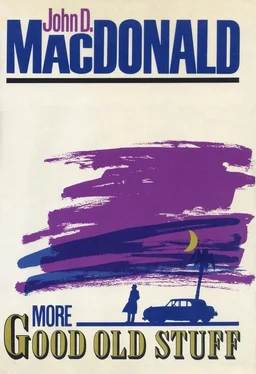
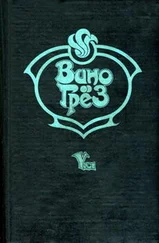
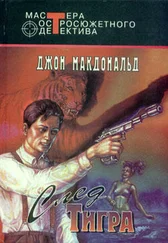
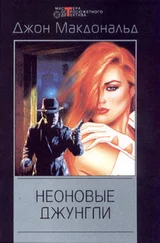

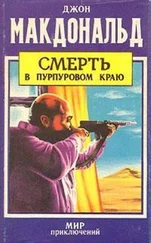



![Джон Макдональд - Wine of the Dreamers [= Planet of the Dreamers]](/books/430039/dzhon-makdonald-wine-of-the-dreamers-planet-of-thumb.webp)

